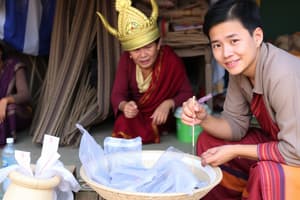Podcast
Questions and Answers
What was the impact of the establishment of the Ministry of Culture in 1952?
What was the impact of the establishment of the Ministry of Culture in 1952?
- Led to the dissolution of the Ministry of Culture
- Resulted in the dominance of Thai national culture over local cultures (correct)
- Encouraged the preservation of local languages
- Promoted national unity and cultural diversity
What was the primary motive behind changing 'Thailand' back to 'Siam' under the government of Pridi Banomyong in 1945?
What was the primary motive behind changing 'Thailand' back to 'Siam' under the government of Pridi Banomyong in 1945?
- To increase international recognition of the country
- To promote national uniformity
- To emphasize the exclusive policy of Thailand
- To counter the dominance of Thai culture over other local ethnic groups (correct)
Why did the government change the country's name back to 'Thailand' when Phibun returned to office in 1948?
Why did the government change the country's name back to 'Thailand' when Phibun returned to office in 1948?
- To emphasize an exclusive national identity (correct)
- To establish a more inclusive national policy
- To counter the dominance of Thai culture over local cultures
- To promote genuine national unity
What was the effect of the dissolution of the Ministry of Culture under the Sarit government in 1958?
What was the effect of the dissolution of the Ministry of Culture under the Sarit government in 1958?
What was a key difference between Thailand's exclusive policy and Siam's inclusive policy?
What was a key difference between Thailand's exclusive policy and Siam's inclusive policy?
Flashcards are hidden until you start studying
Study Notes
Construction of "Thainess"
- The concept of "Thainess" was created during the Phibun government, which was in power from 1938 to 1944 and again from 1948 to 1957.
- The Phibun government issued a series of decrees called the Ratthaniyom or Cultural Mandates, which aimed to promote a national culture and motivate citizens to pursue national goals.
Ratthaniyom or Cultural Mandates
- The Ratthaniyom or Cultural Mandates are a series of 12 edicts issued between 1939 and 1942.
- The first mandate, issued on June 24, 1939, changed the country's name from Siam to Thailand, marking a shift from Siamese identity to Thai nationalism.
Mandates 1-5
- Mandate 1: The country, people, and nationality were to be called "Thai."
- Mandate 2:
- Thai people must not engage in business without considering the benefit and safety of the nation.
- Thai people must not reveal anything to foreigners that might damage the nation.
- Thai people must not act as agents or spokesmen for foreigners without considering the benefit of the Thai nation.
- Thai people must not secretly purchase land on behalf of foreigners in a way that endangers the nation.
- Mandate 5: Promotes local economy and self-reliance, supporting indigenous agricultural products to help the economy.
Mandate 9 and Later
- Mandate 9:
- Thai people must extol, honor, and respect the Thai language.
- Thai people must study the national language and be able to read and write.
- Husbands should kiss their wives before going to work, and women should wear hats and gloves in the Western manner.
- Later mandates promoted Westernization and modernization, excluding local culture and knowledge.
Impact of the Cultural Mandates
- The Cultural Mandates led to the transformation of Old Siam into New Thailand, promoting modernization and Westernization.
- Local culture and knowledge were excluded, and the ruling elite adopted Western tastes, fashion, and deportment.
- The National Culture Council (NCC) was established in 1942 to promote a civilized appearance of the Thai nation, including dress and manners.
Studying That Suits You
Use AI to generate personalized quizzes and flashcards to suit your learning preferences.




